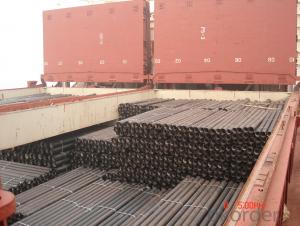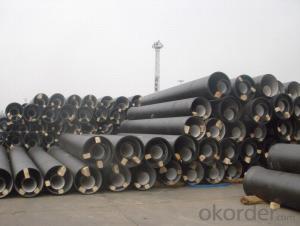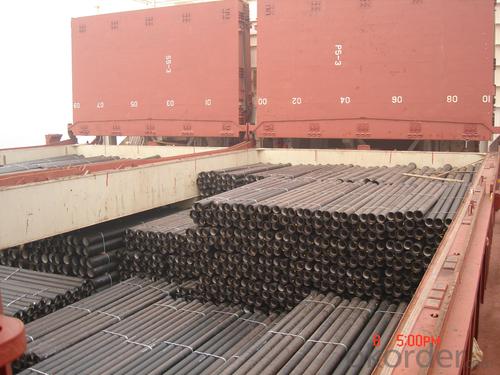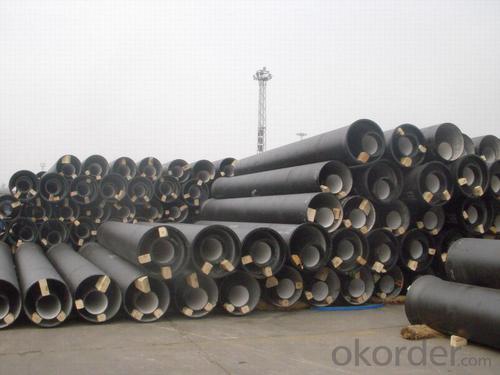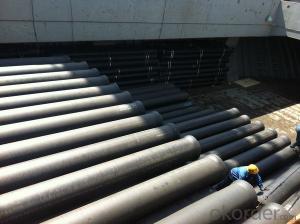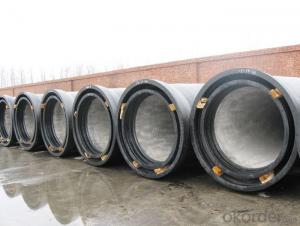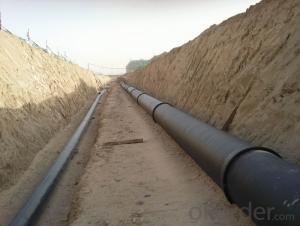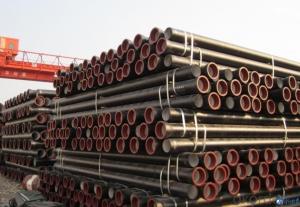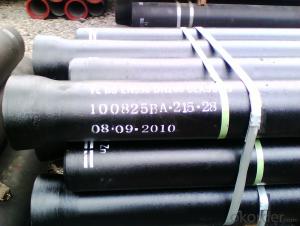Ductile Iron Pipe ISO2531:1998 C CLASS DN800
- Loading Port:
- China main port
- Payment Terms:
- TT or LC
- Min Order Qty:
- 20 m.t.
- Supply Capability:
- 50000 m.t./month
OKorder Service Pledge
OKorder Financial Service
You Might Also Like
1.Ductile Iron Pipe Description :
DI pipe fittings are manufactured according to ISO 2531 or BS EN545 or BS4772 FOR POTABLE WATER ,internal is cement lining or wet epoxy coating;External is zinc plus bitumen or wet epoxy coating. We also manufacture ductile iron fittings with fusion bonded epoxy both inside and outside. All the producets are sutible to water pipes fields.We have passed ISO9001,ISO14001,OHSMS18001 certificate.
2.Main Features of the Ductile Iron Pipe:
1. Material: Ductile iron grade 500-7/ 450-10 in accordance with ISO1083
2. Standard: ISO 2531, EN545, EN598, ANSI, AWWA
3. Certificate: ISO9001, ISO14001, SGS, NSF, WRAS
4. Test: In accordance with ISO 2531 / EN 545 / EN598 and 100% water pressure test
5. Length: 6m or cut into 5.6m, 5.7m, 5.8m
6. Internal Lining: Cement, conform to ISO4179
7. External coating: Zinc + Bitumen, conform to ISO8179
3.Ductile Iron Pipe Images:
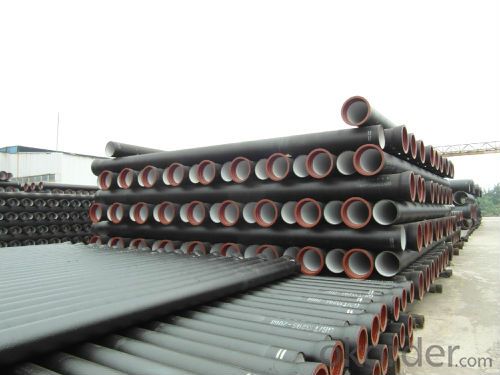
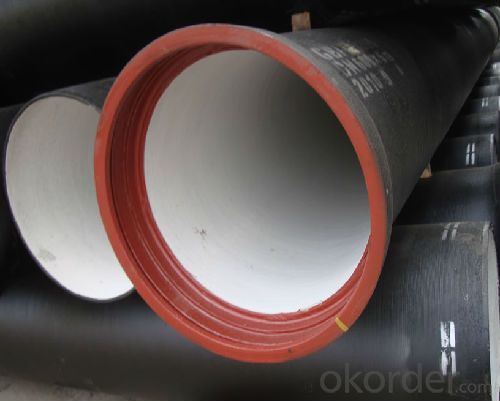
4.Ductile Iron Pipe Specification:
Model Number: DN80-1600
Length: 6M/5.7M/NEGOTIATED
Standard: ISO2531 / EN545
Application: Potable/Sewage Water
Diameter: DN80-1600
Shape: Round
Hardness: 230
Pipe Wall Thickness: standerd
Pull Strength: 420
Yield (≥ MPa): 300
5.FAQ:
We have organized several common questions for our clients,may help you sincerely:
1.Q: Why would you choose ductile iron pipe rather than other pipe materials?
A:The reasons are obvious for that not only ductile iron pipe possesses the inherent strength and flexibility of ductile
iron, combined with proven corrosion protection systems, but also the cost savings can be achieved from design to
installation and commissioning.
2.Q:Why can you guarantee the inner of pipes can’t be corroded?
A: High alumina cement mortar lining and sulphate-resistant cement mortar lining. These two special linings are applicable
to inner anti-corrosion for sewage pipes, improving resistance to erosion of the sewage components.
- Q: Are ductile iron pipes suitable for irrigation systems?
- Ductile iron pipes are a great fit for irrigation systems. They are renowned for their durability, strength, and resilience, which makes them an excellent choice for various applications, including irrigation systems. These pipes are capable of withstanding high water pressure and are resistant to corrosion, ensuring the efficiency and longevity of the irrigation system. Furthermore, ductile iron pipes have a smooth interior surface that minimizes friction and allows for efficient water flow, guaranteeing optimal operation of the irrigation system. In addition, these pipes have a long lifespan, reducing the need for frequent replacements and maintenance, making them a cost-effective option for irrigation systems. In conclusion, ductile iron pipes are highly suitable for use in irrigation systems due to their durability, strength, corrosion resistance, and efficient water flow.
- Q: Are ductile iron pipes resistant to chemical attacks?
- Yes, ductile iron pipes are generally resistant to chemical attacks. Ductile iron is known for its high corrosion resistance, making it suitable for a wide range of applications including water and wastewater systems. Ductile iron pipes are typically lined with a protective coating such as cement mortar or epoxy to further enhance their resistance to chemical attacks. This lining acts as a barrier between the pipe material and the corrosive substances, preventing any degradation of the iron. However, it is important to note that the level of resistance can vary depending on the specific chemical being transported and the concentration and temperature of the solution. Therefore, it is always advisable to consult with experts or engineers to ensure the suitability of ductile iron pipes for specific chemical environments.
- Q: Can ductile iron pipes be used for stormwater management systems?
- Indeed, stormwater management systems can utilize ductile iron pipes. Renowned for their robustness and lastingness, ductile iron pipes prove fitting for diverse purposes, including stormwater management. These pipes exhibit resistance against corrosion and possess the ability to endure immense pressure, rendering them perfect for transporting stormwater runoff. Moreover, ductile iron pipes boast an extended lifespan, thereby minimizing the necessity for frequent replacements and upkeep. All in all, when it comes to stormwater management systems, ductile iron pipes serve as a dependable option.
- Q: What are the different methods for testing ductile iron pipe?
- There are several methods available for testing ductile iron pipe to ensure its quality and reliability. These methods include: 1. Hydrostatic Testing: This is the most common method used for testing ductile iron pipe. It involves filling the pipe with water and pressurizing it to a specified level. The pipe is then inspected for any leaks or deformations under the applied pressure. Hydrostatic testing helps determine the pipe's ability to withstand internal pressure without failure. 2. Tensile Testing: This method involves subjecting a sample of the ductile iron pipe to a gradually increasing tensile load until it fractures. The test measures the ultimate tensile strength, yield strength, and elongation of the material. Tensile testing helps evaluate the pipe's mechanical properties and its ability to withstand tension without breaking. 3. Hardness Testing: This method measures the hardness of the ductile iron pipe using various techniques such as Brinell, Rockwell, or Vickers hardness tests. Hardness testing provides information about the material's resistance to deformation, wear, and fatigue. It helps assess the pipe's durability and resistance to external forces. 4. Impact Testing: This method involves striking a notched sample of the ductile iron pipe with a pendulum or falling weight to measure its impact resistance. The test determines the material's ability to absorb energy during sudden loading or impact. Impact testing helps evaluate the pipe's ability to withstand accidental impacts or dynamic loads. 5. Ultrasonic Testing: This non-destructive testing method uses high-frequency sound waves to detect internal defects or discontinuities in the ductile iron pipe. Ultrasonic testing can identify voids, cracks, or inclusions that may affect the pipe's structural integrity. It helps ensure the pipe's soundness and reliability. 6. Magnetic Particle Testing: This method is primarily used for detecting surface or near-surface defects in the ductile iron pipe. It involves applying a magnetic field to the pipe and then applying magnetic particles to the surface. Any defects present will cause the magnetic particles to gather and form visible indications. Magnetic particle testing helps identify surface cracks, laps, or other defects that may affect the pipe's performance. These different testing methods help ensure that ductile iron pipe meets industry standards and specifications, ensuring its quality and reliability in various applications.
- Q: How are ductile iron pipes repaired if they get damaged?
- Ductile iron pipes are typically repaired using various methods depending on the extent of the damage. Common repair techniques include spot repair, where damaged sections are cut out and replaced with new pipe sections, and trenchless repair methods such as pipe lining or pipe bursting. These methods minimize disruption and excavation while ensuring the structural integrity of the pipe is restored.
- Q: Are ductile iron pipes suitable for installation in areas with high traffic loads?
- Yes, ductile iron pipes are suitable for installation in areas with high traffic loads. Due to their inherent strength and durability, ductile iron pipes can withstand heavy loads and are commonly used in applications where there is significant vehicular traffic.
- Q: What is the expected internal lining material for ductile iron pipes?
- Typically, the anticipated internal lining materials for ductile iron pipes are either cement mortar lining or polyethylene lining. Cement mortar lining serves as a protective layer on the inner surface of the ductile iron pipe, shielding it from corrosion and prolonging its lifespan. Conversely, polyethylene lining is a thermoplastic substance that possesses resistance against corrosion, abrasion, and chemicals, making it well-suited for situations involving aggressive substances or poor water quality. Depending on the project's specific requirements and conditions, both lining materials offer their own advantages and are commonly utilized within the industry.
- Q: What are the typical maintenance requirements for ductile iron pipe?
- To maintain ductile iron pipe, it is necessary to conduct regular inspections, clean the pipe, and repair any damage. Inspections play a crucial role in identifying signs of damage, corrosion, or leaks. This can be done visually or using non-destructive testing techniques such as ultrasonic or magnetic particle testing. Regular inspections are important for detecting and addressing issues before they worsen and cause significant damage. Cleaning is another essential maintenance requirement for ductile iron pipe. Over time, sediment, scale, and debris can accumulate inside the pipe, reducing its flow capacity and potentially causing blockages. Regular cleaning methods like high-pressure water jetting or mechanical cleaning can remove these deposits, ensuring optimal flow and preventing problems related to reduced flow or pressure. Repairing any damage or corrosion is crucial for maintaining ductile iron pipe. If cracks, leaks, or other forms of damage are detected during inspections, prompt repairs are necessary to prevent further deterioration and potential failure. Depending on the extent of the damage, repairs may include welding, epoxy lining, or replacement of the affected section of the pipe. In addition to these specific maintenance requirements, implementing a comprehensive maintenance program is important. This may involve preventative measures such as cathodic protection to prevent corrosion or the application of protective coatings to extend the pipe's lifespan. Overall, regular inspections, cleaning, and repairs are necessary for maintaining ductile iron pipe. Following these maintenance practices ensures the pipe's longevity, reliability, and optimal performance, reducing the risk of failures and disruptions.
- Q: Why is the cast iron tube lined with cement? Under what circumstances are ductile iron pipes lined with cement, and under what circumstances do not have to be lined with cement?
- The cement lining protects the water quality, reduces the head loss and improves the service life of the spheroidal graphite pipe. As long as the water delivery hose is used, the cement lining must be used. There is no lining cement for conveying air.
- Q: Can ductile iron pipe be used for water distribution systems in cold climates?
- Yes, ductile iron pipe can be used for water distribution systems in cold climates. Ductile iron has excellent resistance to freezing and can withstand extreme cold temperatures without becoming brittle or cracking, making it a suitable choice for water distribution systems in cold climates.
Send your message to us
Ductile Iron Pipe ISO2531:1998 C CLASS DN800
- Loading Port:
- China main port
- Payment Terms:
- TT or LC
- Min Order Qty:
- 20 m.t.
- Supply Capability:
- 50000 m.t./month
OKorder Service Pledge
OKorder Financial Service
Similar products
Hot products
Hot Searches
Related keywords
